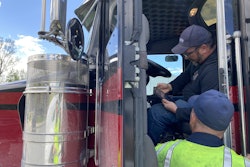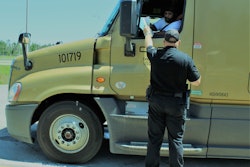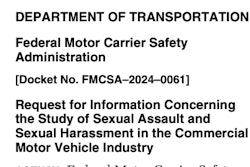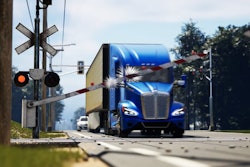Trucking news and briefs for Friday, Sept. 12, 2025:
- Enforce the "Twenty Eight Hour Law?" Lawmakers are calling for increased protections for livestock in transit.
- Arizona officials update their progress on the I-40/U.S. 93 interchange project.
- "I saw a dead deer in the road and all of a sudden I saw a flaming vehicle. A fire extinguisher wouldn’t have done any good. The vehicle was totally engulfed in flames.” --Kevin Wojtasiak, Bay & Bay Transportation driver, about the scene of a deer strike where he offered assistance
Legislation aims to protect livestock during interstate transport
Congresswoman Dina Titus (D-Nevada) has introduced bipartisan legislation aimed at protecting farm animals from disease and inhumane treatment when they are transported over long distances in the United States.
“For far too long, federal regulations requiring humane treatment of transported farm animals have not been enforced,” Titus said. “The Humane Transport of Farmed Animals Act would stop this lax regulation that has resulted in many animals being injured or succumbing to disease during transport.”
Titus introduced the same bill during the previous Congressional session, but no action was taken on it.
The Humane Transport of Farmed Animals Act would require the Department of Transportation and the Department of Agriculture (USDA) to develop a mechanism to monitor compliance with the what's known as the "Twenty-Eight Hour Law," requiring animals to be offloaded for food, water and rest if they have traveled for 28 hours or more.
While U.S. regulations for international animal exports guarantee livestock are healthy and fit to travel, interstate transportation lacks similar requirements, according to Titus. Without these guidelines, sickly and newborn animals are permitted to be transported over long distances, contributing to the spread of pathogens. To remedy this, the bill would also prohibit the interstate transport of livestock deemed unfit for travel due to sickness, injury, or other conditions.

“The worst abuses in farmed animal transport occur when animals are hauled extremely long distances or when they are ill, disabled, or otherwise in such poor condition that they can’t withstand the journey,” said Adrienne Craig, senior policy associate and staff attorney for the Animal Welfare Institute’s Farmed Animal Program. “The millions of animals carried on our roads every year should be entitled to protection under our nation’s oldest animal welfare law -- the Twenty-Eight Hour Law -- but that’s not possible without a clear mechanism for enforcement and cooperation among agencies.”
Representatives Kimberlyn King-Hinds (R-Commonwealth of the Northern Mariana Islands), Eleanor Holmes Norton (D-Washington, D.C.), Steve Cohen (D-Tennessee), and Rashida Tlaib (D-Michigan) also signed onto the Humane Transport of Farmed Animals Act as original cosponsors.
[Related: Finding your niche haul: The tradeoffs and triumphs of specialization]
Arizona reaches halfway point on I-40/U.S. 93 interchange
The Arizona Department of Transportation announced this week it has reached the halfway mark on a $106 million project to construct a free-flowing interchange that it said will reduce delays on the main route between Las Vegas and Arizona.
This milestone comes just 15 months into building a new connection between I-40 and U.S. 93 in west Kingman. Instead of traffic stopping for a signal on Beale Street at I-40, one mile of new ramps will allow traffic to flow freely between I-40 and U.S. 93.
[Related: Arizona I-40 rougher than a corncob? You bet, particularly between Kingman and Flagstaff]
Some of the most visible progress on the interchange includes building new structures, ADOT noted. On I-40 above Clack Canyon, part of a bridge is taking shape that will carry traffic from southbound U.S. 93 to eastbound I-40. Along U.S. 93, tunnels are now in place that will allow future U.S. 93 traffic to pass over Beale Street and Fort Beale Drive.
Earthwork is underway throughout the project area, including excavation along SB U.S. 93 and building up an embankment on I-40 where ramps will connect it to U.S. 93. And on I-40, sound walls are rising on the WB side between Stockton Hill and White Cliffs roads.
Construction will continue to involve daytime and nighttime work, including nighttime closures of U.S. 93 for rock blasting. The closures, when needed, will only be scheduled from 8 to 9 p.m. on weeknights. This involves a section of U.S. 93 between the I-40/U.S. 93 interchange and the U.S. 93/State Route 68 interchange, ongoing through October.
ADOT is maintaining two lanes of travel in each direction during peak travel times, with lane restrictions limited to off-peak hours. Drivers are able to continue exiting both U.S. 93 and I-40 at Beale Street to access businesses, Route 66 and downtown Kingman.
Construction is expected to continue into 2027, when the interchange will open with 6 miles of widened or newly constructed roadway. The project includes five new bridges, two bridge widenings, four bridge rehabilitations and 2 miles of sound walls.
The project is creating a mile of new highway carrying traffic northwest of the existing interchange at I-40 and Beale Street. Other features include:
- Widening more than a mile of I-40 in both directions between the new interchange and Stockton Hill Road
- Adding a merge lane on U.S. 93 NB
- Widening and/or rehabilitating four bridges on I-40
- Building sound walls along a portion of I-40 to the west of Stockton Hill Road
- Constructing drainage features
The interchange is designed to handle projected traffic growth for the next 25 years.
[Related: Owner-operators call out the absolute worst stretch of highway in America]
Driver’s actions to assist at car fire scene earns recognition
The Truckload Carriers Association has named Kevin Wojtasiak, a truck driver for Bay & Bay Transportation, a Highway Angel for his courageous and compassionate actions during a roadside emergency in Clarks Grove, Minnesota.
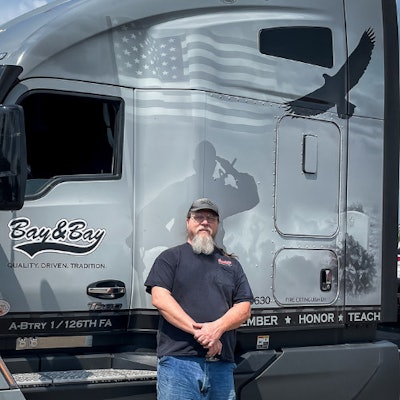 Kevin Wojtasiak
Kevin Wojtasiak
Without hesitation, Wojtasiak pulled over to assist, ensuring the driver and three passengers were safely out of harm’s way. He remained at the scene until emergency responders arrived, offering water and reassurance to the motorists, who, remarkably, escaped injury despite the fire.
“They hit a deer -- I saw a dead deer in the road and all of a sudden I saw a flaming vehicle,” Wojtasiak said “A fire extinguisher wouldn’t have done any good. The vehicle was totally engulfed in flames.”
With more than 2 million safe miles driven during his career, Wojtasiak exemplifies the professionalism, selflessness, and dedication to public safety that define America’s truck drivers, TCA said.
“We are incredibly proud of Kevin for his heroic actions,” said Savannah Snelgrove, Marketing Manager at Bay & Bay Transportation. “He represents the highest standards of our company and the trucking industry as a whole. Being named a TCA Highway Angel is a well-deserved honor.”
